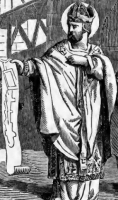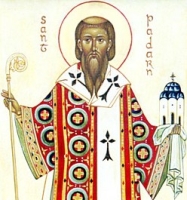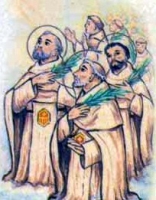| 15 April |
• yesterday • tomorrow |

Caeser
A middle child - the seventh of thirteen children, and raised as a pious child. Soldier at age 18, and fought in the war against the Huguenots. Joined the navy to fight in the siege of La Rochelle, but illness kept him from the fight. He lived for three years in Paris, France, devoted to poetry and painting and to wild and frivolous living. Back in his home town of Cavaillon, he took over the position of his late brother as canon of Salon, a position he wanted for its income and connections instead of its spiritual significance. One night while on his way to a masked ball, he passed a shrine where a small light was burning before an image of the Virgin Mary. He was suddenly overwhelmed by the memory that a friend, Antoinette Reveillade, had prayed fervently for his salvation. He realized that there was no way he could live a life offending God and then expect to be accepted in the end. There, on the road, he had a complete conversion.
Ordained in 1582. Canon in Avignon. He was profoundly affected reading a biography of Saint Charles Borromeo, and tried to take him as a model in all things, especially his devotion to catechesis. Worked as a catechist in Aix-in-Provence, France, an area in turmoil following the Religious Wars. Saint Francis de Sales called him “a star of the first magnitude in the firmament of Catechesis.” He founded the Ursulines of Province and the Fathers of Christian Doctrine (Doctrinarians). The Fathers were destroyed during the French Revolution, but an Italian branch, the Doctrinarian Fathers continues today with houses in Italy, France and Brazil.
3 February 1544 in Cavillon, Vaucluse, France
• Easter Sunday, 15 April 1607 in Avignon, Vaucluse, France of natural causes
• interred in the church of Saint Mary in Monticelli in Rome, Italy
15 May 2022 by Pope
the canonization miracle involved the healing a young woman of "meningitis in patient with cerebral hemorrhage" in 2016 in Salerno, Italy
catechists
I was so beside myself and fired with such a longing to do something in imitation of him, that I would not give my eyes sleep or my days rest until I had given some beginning to this resolution of mine. - Blessed Cesar de Bus, writing about Saint Charles Borromeo
Blessed César de Bus, you who left us the admirable example of a life completely dedicated to God, you who were on fire with the desire to communicate the life of God to your brothers, intercede for us with the Lord now, so that the same fire may consume us and the same charity urge us. - Pope Paul VI during the beatification of Blessed Cesar
In the year of his birth at Cavaillon, the Christian world is in a crisis, one of the most serious crises in its history. A crisis that is not only a religious and doctrinal one, but also a crisis of civilization, with the afflux of new movements of thought, not all negative, but which confuse the mass of the faithful. Cesar de Bus came into the world in this troubled period when men are gradually opening up to culture, to the arts and to the reign of pleasure. He let himself be swept along, during adolescence and early manhood, to the life of ease for which his social status and his fortune marked him out, the superficial, careless life of a gifted being, brilliant in society, a poet when he liked, more sensitive to the appeal of pleasure in every form than to the demands of the Gospel. …After his conversion, the spiritual progress of the Blessed was not without its upsets, moments of discouragement, darkness and uncertainty. We have been struck, however, by what was to be, almost from the beginning, a characteristic of his whole life. Perhaps that is the secret of his constancy, or in any case, what always enabled him to overcome his difficulties and start off again with increased energy; we are referring to his “spirit of repentance.” Repentance is not an empty word for him. He carries it to its extreme consequences, for he has come back from afar! He must master the passion of which he was the slave in the past, a violent and perpetual battle against carnal temptations. He learns in this way to seek and love sacrifice, for sacrifice configures one with Christ Suffering and Victorious. To offer himself as a libation, to leave everything in God’s hand at the cost of the greatest renunciations, this seems to have been the leitmotif, the perpetual aim of his efforts. And when, at the end of his life, suffering and afflicted with blindness for 14 years, he is at last able to prepare for the supreme gift, he will realize how useful asceticism has been to master the old Adam. He will be ready to meet the Lord. His joy will be perfect. The aim of Father de Bus is to communicate Christian doctrine to the people. The idea is far from being new. From the beginning the first Christians were anxious to transmit, and transmit exactly, the essential part of what they had received. Collections gathering the most outstanding events and sayings in the midst of a pagan world and in view of the dangers of doctrinal deviation, to inculcate in catechumens and recall to disciples a “kerygma,” that is, a central core, a “summary of the faith” containing the essential elements, which can serve as a basis for developments adapted to circumstances and to the psychology of listeners. It is necessary to give a solid foundation to their faith, to support their affective and charitable attachment to the living God with a knowledge of the truths of faith that will correspond to this love. This is a period in which the world is in crisis, as formerly, and in which most values, even the most sacred ones, are rashly questioned in the name of freedom, so that many people have no longer any point of reference, in a period in which danger comes certainly not from an excess of dogmatism but rather from the dissolution of doctrine and the nebulousness of thought. It seems to Us that an additional effort should be courageously undertaken to give the Christian people, who are waiting for it more than is thought, a solid, exact catechetical base, easy to remember. We well understand that it is difficult today to adhere to the Faith, particularly for the young, a prey to so many uncertainites. They have the right at least to know precisely the message of Revelation, which is not the fruit of research, and to be the witnesses of a Church that lives by it. - Pope Paul VI during the beatification of Blessed Cesar
https://catholicsaints.info/saint-cesar-de-bus/
• The Holy Washerwoman
• Huna, Una
Daughter of the duke of Alsace. Wife of an Alsatian nobleman named Huno of Hunnaweyer, she lived in the diocese of Strasbourg. Mother of one; her son, Deodatus, was baptized by Saint Deodatus of Nevers, and eventually became a monk. Donated property to monasteries, and financed the construction of churches. Devoted to the poor, Hunna would help the less advantaged with any task, and was given to helping all her neighbors, regardless of class or station, with their laundry.
7th century in the Alsace region (part of modern France)
• 679 in Hunawir, Alsace (in modern France) of natural causes
• buried there
• relics re-located on 15 April 1520
• a holy, healing well sits near her shrine
• relics destroyed during the Reformation
1520 by Pope Leo X
• laundresses, laundry workers, washerwomen
• noblewoman surrounded by linens
• woman washing clothes for the poor and sick
• with Saint Deodatus of Nevers
https://catholicsaints.info/saint-hunna-of-alsace/
• Ruadhán mac Fergusa Birn
• one of the Twelve Apostles of Ireland
• Rodan, Rodanus, Rowan, Ruadain, Ruadan, Ruadanus, Ruadhain
Related to the royal family of Munster (part of modern Ireland. Studied under Saint Finian of Clonard. Founded the monastery of Lorrha c.545, and served as its first abbot. His brother monks produced the Stowe Missal, and his abbot‘s bell is preserved in the British Museum. Ruadhan’s embassy to King Dermot of Tara in 556 is recounted in the romance the Cursing of Tara where he is supposed to have cursed Dermot for violating the sanctuary of the Lorrha monastery in order to capture the king of Connaught. Considered a confessor of the faith, and one of the Twelve Apostles of Erin.
Leinster, Ireland
• 5 April 584 in the monastery of Lorrha, County Tipperary, Ireland of natural causes
• his hand was preserved in a silver shrine in Lorrha, but destroyed during the Reformation
https://catholicsaints.info/saint-ruadhan-of-lorrha/
Acoitius, Agontius, Habundius
Described by Saint Gregory the Great, who wrote about him in the Dialogues, as a man of great humility and diginity in his fulfillment of work. Legend says that one day a girl with crippled hands prayed to Saint Peter the Apostle for his intercession in their healing; he appeared to her in a dream, told her to ask for the intercession of Saint Abbondio; when she did, Abbondio appear to her in a vision, took her by the hand and healed her on the spot.
c.564
https://catholicsaints.info/saint-abbondio-15-april/
• Lorenzo Sossio
• Lorenzino (Little Lawrence)
Martyred five-year-old boy. Though anti-Semitic groups have claimed that Lorenzo was killed by Jews as part of some ill-defined Passover need, it’s a lie.
c.1480
Good Friday, 485 in Valrovina, Italy
5 September 1867 by Pope Pius IX (decree of martyrdom)
https://catholicsaints.info/blessed-laurentinus-sossius/

Vasilissa
Born to the Imperial Roman nobility. Spiritual student of Saint Peter the Apostle and Saint Paul the Apostle whose bodies she helped to bury. Martyred in the persecutions of Nero.
c.68
• tailors
• Xativa, Spain
https://catholicsaints.info/saint-basilissa-of-rome/

Born to the Imperial Roman nobility. Spiritual student of Saint Peter the Apostle and Saint Paul the Apostle whose bodies she helped to bury. Martyred in the persecutions of Nero.
beheaded c.68 at Rome, Italy
• tailors
• Xativa, Spain
https://catholicsaints.info/saint-anastasia-of-rome/

Marón, Marone
Friend of Saint Flavia Domitilla, whom they accompanied in exile to the island of Ponza. Martyred in the persecutions of Trajan.
beheaded c.99 in Rome, Italy
• Civitanova Marche, Italy
• Monteleone, Italy
https://catholicsaints.info/saint-maro-of-rome/

Foix, Padarn, Pair, Patier
Son of Patranus. Monk at Ansion, France. Hermit near Coutances, France. Bishop of Avranches, France.
c.482 in Poitiers, France
c.568 of natural causes
https://catholicsaints.info/saint-paternus-of-avranches/

Badarn, Padarn, Paterno, Patern
Helped found the monastery of Llanbadarn Fawr in Wales where he served as abbot. Noted preacher in the area around Aberystwyth, Wales.
482
565 of natural causes
https://catholicsaints.info/saint-paternus-of-wales/
Christian widow who became famous in rural Sweden for her charity work with the poor and sick. Saint Huna never worked in Slättåkra, but the first church in the parish was dedicated to her, and her name became associated with the town.
https://catholicsaints.info/saint-huna-of-slattakra/
Waltmann of Antwerp
Accompanied Saint Norbert of Xanten to Cambrai, France to preach against heresy. Remained as abbot of Saint Michael’s at Antwerp, Belgium.
1138 of natural causes
https://catholicsaints.info/saint-waltmann-of-cambrai/
Friend of Saint Flavia Domitilla, whom they accompanied in exile to the island of Ponza. Martyred in the persecutions of Trajan.
martyred in Rome, Italy
https://catholicsaints.info/saint-victorinus-of-rome/
Friend of Saint Flavia Domitilla, whom they accompanied in exile to the island of Ponza. Martyred in the persecutions of Trajan.
martyred in Rome, Italy
https://catholicsaints.info/saint-eutyches-of-rome/
Monk. Abbot of Landelles Abbey, Bayeux, France. Noted for the austerity of his personal life and his dedication to caring for the area poor and sick.
https://catholicsaints.info/saint-ortario-of-landelles/
Nidgar, Nitgar
Abbot of Ottobeuren in Bavaria, Germany. Bishop of Augsburg, Germany.
c.829 of natural causes
https://catholicsaints.info/saint-nidger-of-augsburg/
Martyr.
• in Ferentino, Italy
• appeared in a vision to Saint Redemptus of Ferentini
https://catholicsaints.info/saint-eutychius-of-ferentino/
Born to the Persian nobility. Martyred in the persecutions of Decius.
beaten to death in 251
https://catholicsaints.info/saint-olympiades-of-persia/
Crescent, Crescente
Martyr.
burned at the stake in Myra (in modern Turkey)
https://catholicsaints.info/saint-crescens-of-myra/
Born to the Persian nobility. Martyred in the persecutions of Decius.
beaten to death in 251
https://catholicsaints.info/saint-maximus-of-persia/
Pausilippo
Martyred in Thrace in the persecutions of Hadrian.
https://catholicsaints.info/saint-pausilopo-of-thrace/
Abbot of Moutier-Saint-Jean Abbey near Dijon, France.
c.625
https://catholicsaints.info/saint-sylvester-of-reome/
Munde, Mund, Mond
Abbot who founded several monasteries in Argyle, Scotland.
c.962
https://catholicsaints.info/saint-mundus/
Bishop of Metz, France from 697 to 707.
707 of natural causes
https://catholicsaints.info/saint-abbo-ii-of-metz/
Martyred in Thrace in the persecutions of Hadrian.
https://catholicsaints.info/saint-theodore-of-thrace/
Martyred in Mesopotamia.
https://catholicsaints.info/saint-acuta-15-april/

A group of Mercedarian monks sailing to Africa as on a mission to redeem capture Christians. Captured by Moors, they were tortured and executed for their faith. Martyrs.
1393
https://catholicsaints.info/mercedarian-martyrs-of-africa/
CatholicSaints.Info Portable Edition